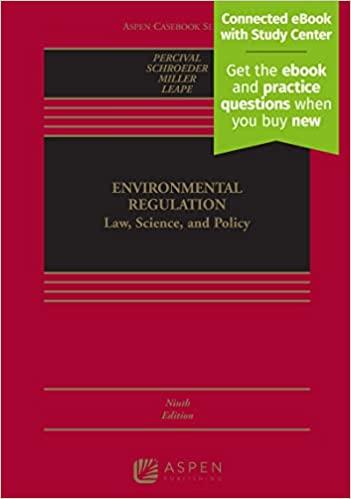Question
dw.... 1. Which one of the following agreements / contracts are void? a. Affected by mistake of one party to the contract as to a
dw....
1. Which one of the following agreements / contracts are void?
a. Affected by mistake of one party to the contract as to a fact
b. Affected by mistake of one party to the Contract as to a point of Indian law
c. Affected by mistake of both parties to the Contract as to a fact (Sec 20)
d. Affected by mistake of both parties to the Contract as to a point of India law (ignorance of laws of your own country is no excuse)
2. General rule is "No Consideration, No Contract". Which of the following is an exception to this rule? a. Agreement with a minor without consideration (This is about capacity to contract)
b. Contract where one consideration is past and another is future (This is a good contract)
c. Contract made by a patient with the doctor, being influenced by the doctor (This is about undue influence)
d. None of the above
3. Which of the following is not a negotiable instrument?
a. Bill of Lading (does not come under definition of negotiable instrument act U/s 13 of N.I. Act)
b. Bill of Exchange
c. Crossed Cheque
d. Account Payee Cheque
4. X was in the business of selling kanchipuram saree for last 20 years at Kolkata. Y was manufacturing such sarees at Chennai and had appointed X as his wholesale agent for Kolkata with a force majeure clause. X procured some prepuja orders from his regular customers taking 50% advance, and forwarded the orders to Y. As per agreement Y had to supply the sarees in 15 days. Even after 45 days Y did not supply the sarees, because there was a flood in Y's areas and his machinery were damaged beyond repairs. As a result X lost confidence of his regular customers, besides he had to return the advance taken from the customers along with interest. What are the remedies for X from Y?
a. Claim Interest refunded to customers
b. Claim specific performance of supply of the sarees from wherever possible by Y
c. Claim damages
d. No remedy is available. (Because of force majeure / Section 56 of the Contract Act )
5. "An acceptance is to offer, what a lighted match is to a train of gunpowder. It produces something which cannot be recalled or redone". How would you assess this statement of Anson?
a. True as per UK Contract laws, but not true for Indian Contract laws (section 4 and 5 of Indian Contract Act)
b. Not true for Indian Contract laws
c. Can never be true d. Is always true
6. Distinguish between (a) Condition and Warranty and (b) Indemnity and guarantee. Write only three main points in each case.
(a) Three main points of difference between condition and warranty are as follows : Point Condition: Section 12(2) of Sale of Goods Act, 1930 Warranty : Section 12 (3) of Sale of Goods Act, 1930 Definition A condition is a stipulation essential to the main purpose of the contract. A warranty is a stipulation collateral to the main purpose of the contract. Breach
Breach of a condition, can entitle the party against whom the breach of the condition is committed, to repudiate the contract Breach of warranty can give rise to a claim for damage being made by the party affected, against the party who has committed the breach. Alternative In certain situation breach of condition can be treated as a breach of warranty.( Sec 13 of Sale of Goods Act, 1930) In no situation breach of warranty can be treated as a breach of condition.
(b) Three main points of difference between Indemnity and Guarantee are as follows : Point Indemnity : Section 124 of the Contract Act, 1872 Guarantee : Section 126 of the Contract Act, 1872 Number of parties Indemnifier and Indemnity holder , two parties Principal Debtor, Creditor and Surety, three parties Number of inherent contracts One contract, between the indemnifier and indemnity holder. Three contracts: between Principal Debtor and Creditor, between Principal Debtor and Surety and between Principal Debtor and Surety Primary / Secondary Indemnifier has primary responsibility to meet the obligations. The Surety's liability is secondary on failure of the Principal Debtor. Although after such failure the Creditor can proceed against both the Surety and the Principal Debtor or either of them. Surety = Guaranto
7.
(a)Write bout at least 6 essential elements of
a valid contract.
(b) How does a contract come to an end with operation of law of limitation?
(c) List at least 6 void agreements.
8.
Who is an unpaid seller? What are his rights against
(a) goods covered by the contract and
(b) buyer personally
Step by Step Solution
There are 3 Steps involved in it
Step: 1

Get Instant Access to Expert-Tailored Solutions
See step-by-step solutions with expert insights and AI powered tools for academic success
Step: 2

Step: 3

Ace Your Homework with AI
Get the answers you need in no time with our AI-driven, step-by-step assistance
Get Started


